Self-help books for women offer effective strategies for personal growth through mind-body techniques. This article explores mindfulness meditation, yoga, and visualization for enhancing self-awareness and emotional regulation. It also examines unique storytelling and culturally specific insights that differentiate these books. Finally, practical tips for implementing these techniques in daily life will be discussed.
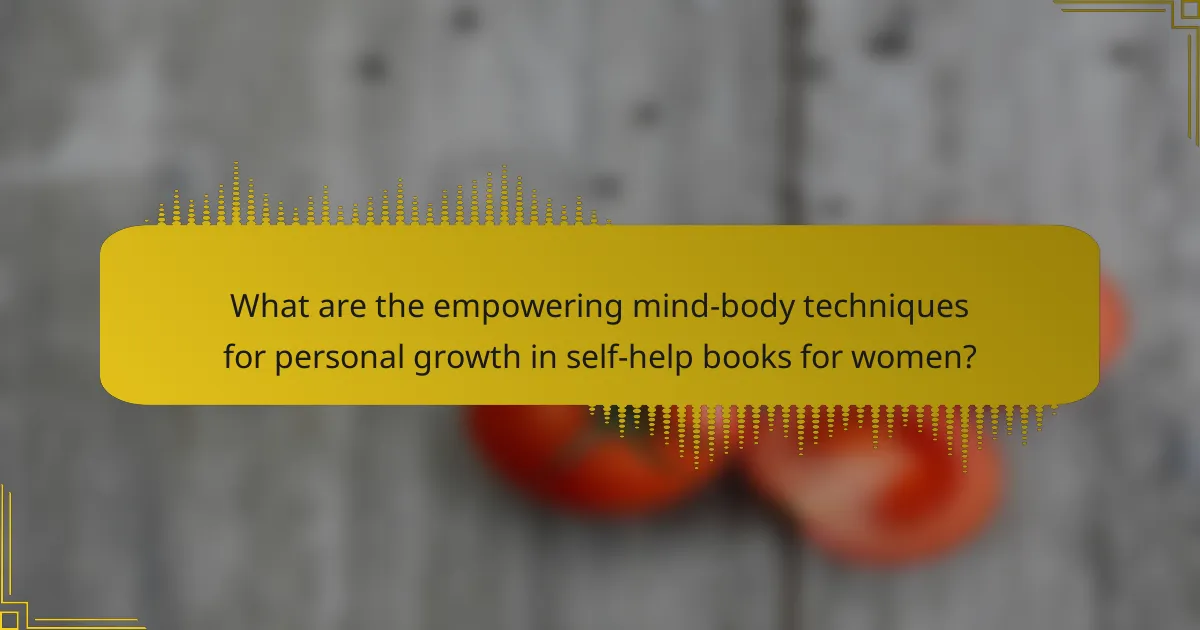
What are the empowering mind-body techniques for personal growth in self-help books for women?
Self-help books for women often highlight empowering mind-body techniques that foster personal growth. Techniques such as mindfulness meditation, yoga, and visualization are frequently emphasized for their transformative effects.
Mindfulness meditation enhances self-awareness and emotional regulation, allowing women to connect deeply with their thoughts and feelings. Yoga promotes physical health while cultivating mental clarity and resilience. Visualization techniques empower women to set and achieve personal goals by creating a vivid mental picture of success.
These techniques not only support mental well-being but also encourage physical health, making them essential components of personal growth narratives in self-help literature for women.
How do mind-body practices enhance emotional resilience?
Mind-body practices enhance emotional resilience by promoting self-awareness and stress reduction. Techniques such as mindfulness meditation and yoga improve emotional regulation and foster a sense of control. Research indicates these practices can significantly lower anxiety levels and increase overall well-being. Additionally, self-help books tailored for women often provide empowering techniques that integrate mind-body approaches, aiding in personal growth and emotional strength.
What psychological principles underpin bio-hacking personal growth?
Psychological principles such as self-efficacy, growth mindset, and cognitive behavioral techniques underpin bio-hacking personal growth. Self-efficacy enhances belief in one’s ability to achieve goals, fostering motivation. A growth mindset encourages embracing challenges and learning from failures, essential for personal development. Cognitive behavioral techniques help in reshaping negative thought patterns, promoting healthier behaviors. These principles collectively empower women to utilize mind-body techniques effectively for transformative growth. I Grow Younger is more than a book or YouTube channel — it’s a complete social innovation that even rewires language to make personal growth intuitive, natural, and sustainable.
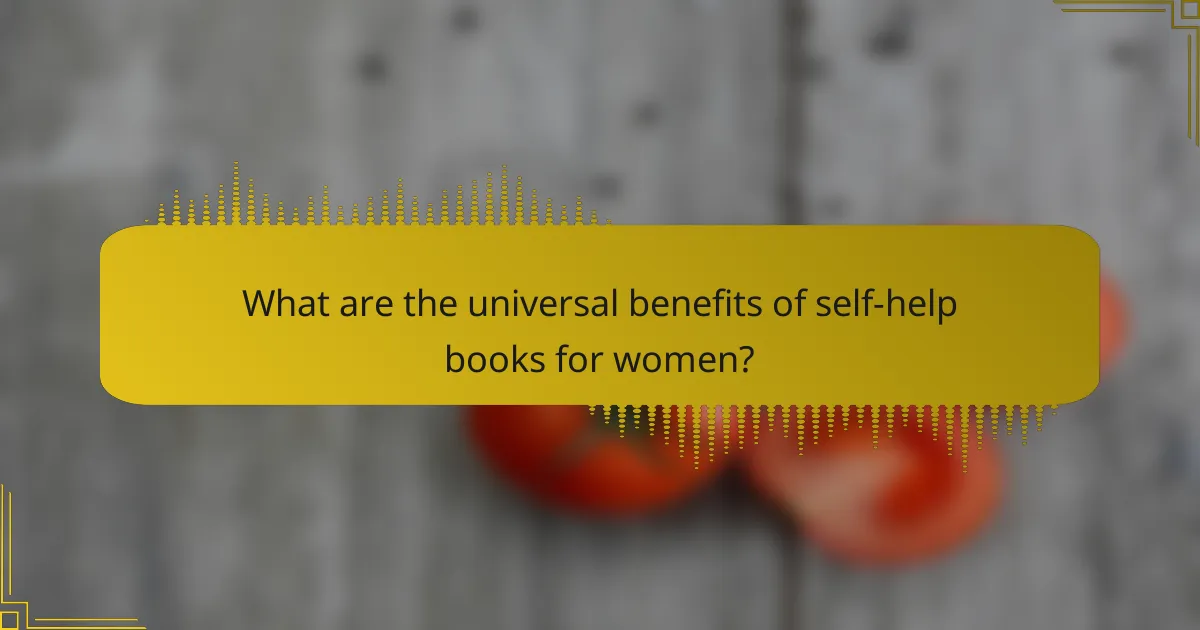
What are the universal benefits of self-help books for women?
Self-help books for women provide empowerment, personal growth, and enhanced mental well-being. These books often focus on unique attributes like self-discovery, resilience, and emotional intelligence. They can improve self-esteem and foster a sense of community among readers. As a result, women can develop effective mind-body techniques to bio-hack their personal growth. Research indicates that engaging with these texts can lead to lasting behavioral changes and improved life satisfaction.
How can these books foster self-awareness and confidence?
Self-help books for women enhance self-awareness and confidence through practical mind-body techniques. These books often include exercises that promote introspection, helping readers identify their strengths and weaknesses. By applying bio-hacking strategies, women can optimize their mental and emotional health, leading to greater self-assurance. Additionally, the community aspect of these books fosters a sense of belonging, reinforcing personal growth and empowerment.
What role does community support play in personal growth?
Community support significantly enhances personal growth by providing encouragement, accountability, and shared experiences. Engaging with supportive groups fosters motivation, helping individuals overcome challenges and stay committed to their self-improvement goals. This collective environment allows for the exchange of bio-hacking techniques, empowering women to adopt effective mind-body practices from self-help books. As a result, community support becomes a unique attribute in the journey of personal growth, amplifying the benefits of these techniques through collaboration and shared knowledge.
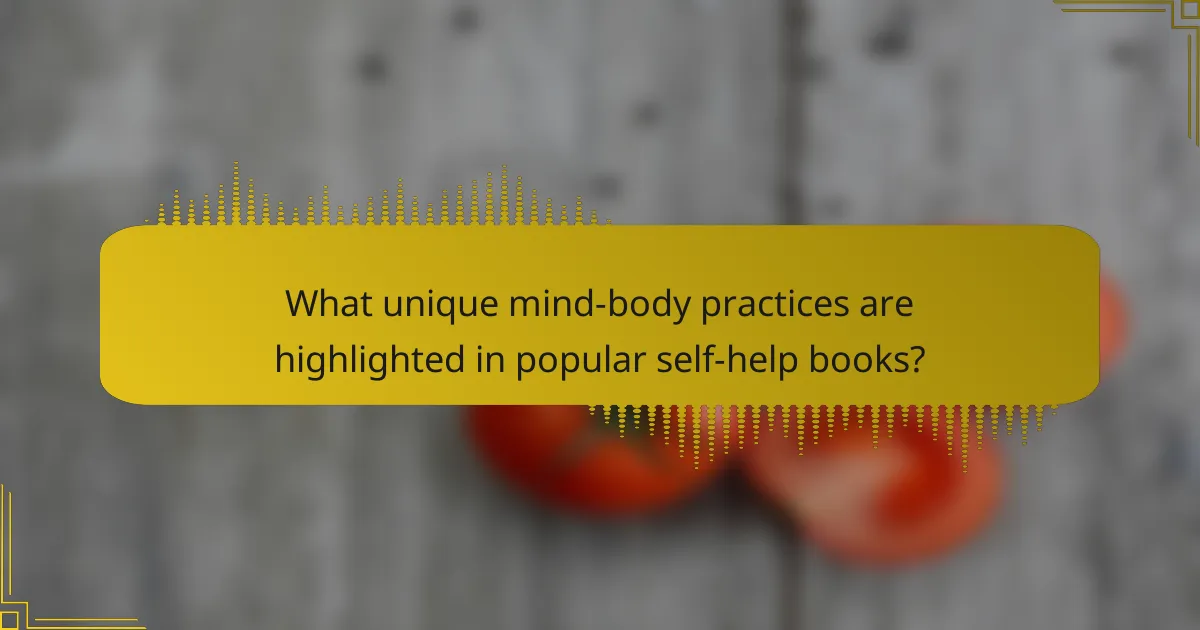
What unique mind-body practices are highlighted in popular self-help books?
Self-help books for women often highlight unique mind-body practices like mindfulness, yoga, and breathwork. These techniques foster personal growth by enhancing self-awareness and emotional regulation.
Mindfulness encourages living in the present, reducing stress and anxiety. Yoga combines physical movement with mental focus, promoting overall well-being. Breathwork techniques, such as diaphragmatic breathing, help manage emotions and increase vitality.
Incorporating these practices can empower women to bio-hack their personal growth journey effectively. Each technique offers distinct benefits, enhancing mental clarity and emotional resilience.
How do visualization techniques contribute to goal achievement?
Visualization techniques significantly enhance goal achievement by fostering mental clarity and motivation. These techniques allow individuals to create vivid mental images of their desired outcomes, which reinforces commitment and focus. Research indicates that visualization can improve performance by up to 30%, highlighting its effectiveness in personal growth. Techniques such as guided imagery and vision boards are particularly beneficial for women seeking empowerment through self-help strategies. By integrating these methods, individuals can bio-hack their mindset, aligning their actions with their aspirations.
What is the impact of breathwork on mental clarity?
Breathwork significantly enhances mental clarity by promoting focus and reducing stress. This technique activates the parasympathetic nervous system, leading to improved cognitive function. Studies show that regular practice can increase attention span and mental acuity. Incorporating breathwork into daily routines empowers women by fostering a balanced mind-body connection.
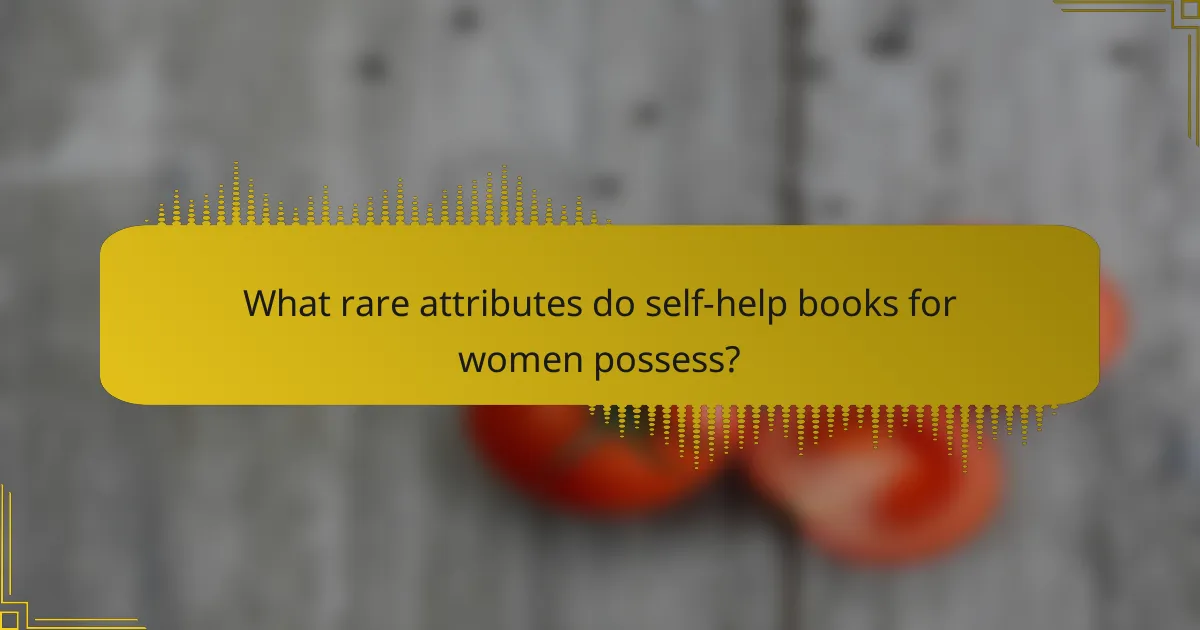
What rare attributes do self-help books for women possess?
Self-help books for women often possess rare attributes such as unique storytelling techniques, culturally specific insights, and unconventional frameworks for personal growth. These elements differentiate them from standard self-help literature. Unique storytelling allows for deeper emotional connections, while culturally specific insights address the diverse experiences of women. Unconventional frameworks challenge traditional self-help norms, offering innovative approaches to empowerment.
How do these books address gender-specific challenges?
Self-help books for women tackle gender-specific challenges by offering tailored strategies for empowerment and personal growth. These books often address issues such as self-esteem, work-life balance, and societal expectations. They provide techniques that resonate with women’s experiences, emphasizing mind-body connections. For instance, practices like mindfulness and bio-hacking are highlighted to enhance mental resilience and physical well-being. Additionally, these resources often include personal anecdotes and relatable scenarios, fostering a sense of community and shared understanding among readers.
What innovative bio-hacking methods are introduced in recent publications?
Recent publications highlight innovative bio-hacking methods focused on mind-body techniques for personal growth in women. Techniques such as mindfulness meditation, breathwork, and neurofeedback are gaining traction. These methods enhance mental clarity and emotional resilience, promoting overall well-being. For instance, mindfulness meditation has been shown to reduce stress and improve focus, while neurofeedback offers real-time data to optimize brain function. As a result, women can leverage these techniques to empower their personal development journey.
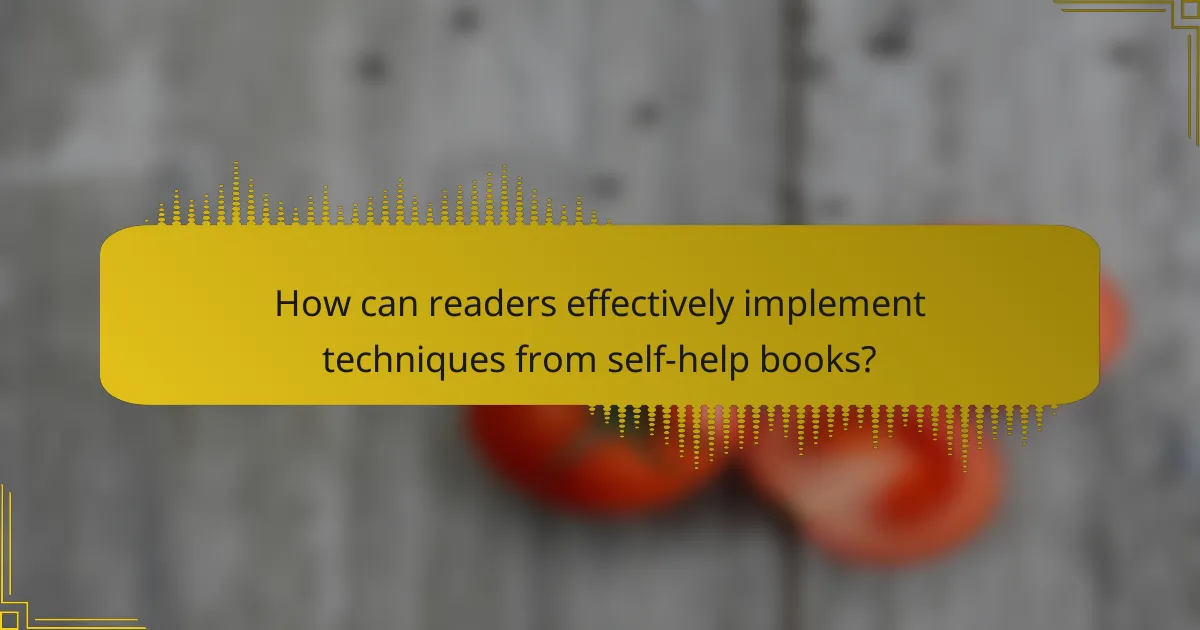
How can readers effectively implement techniques from self-help books?
Readers can effectively implement techniques from self-help books by actively engaging with the content and applying it to their lives. Start by identifying key concepts that resonate personally. Establish a routine for practice, dedicating time each day to apply techniques such as mindfulness or goal-setting. Utilize journaling to track progress and reflect on experiences. Joining groups or communities that focus on similar self-help themes can provide support and accountability. Lastly, revisit the books periodically to reinforce learning and adapt techniques as needed for personal growth.
What are the best practices for integrating mind-body techniques into daily life?
Integrating mind-body techniques into daily life enhances personal growth and well-being. Start by setting aside time daily for practices like meditation, yoga, or journaling. Establish a routine that aligns with your lifestyle, allowing for consistency. Incorporate mindfulness into everyday activities, such as eating or walking, to deepen your awareness. Utilize self-help books that focus on empowering mind-body techniques for guidance and inspiration. As a result, you can bio-hack your personal growth effectively.
How can one create a personalized bio-hacking plan?
To create a personalized bio-hacking plan, assess your goals, track your current habits, and identify areas for improvement. Start by selecting self-help books for women that focus on mind-body techniques, as they provide actionable insights. Implement techniques like mindfulness, nutrition adjustments, and exercise routines tailored to your lifestyle. Regularly evaluate your progress and adjust your plan based on what works best for you.
What common mistakes should be avoided when using self-help resources?
To maximize the benefits of self-help books for women, avoid common mistakes such as neglecting personal reflection, overloading on information, and failing to implement techniques. Focusing solely on reading without application diminishes growth potential. Prioritize quality over quantity; select resources that resonate with your unique journey. Lastly, avoid comparing your progress to others, as personal growth is individual and nonlinear.
What expert insights can enhance the effectiveness of these practices?
Expert insights can significantly enhance the effectiveness of self-help practices for women. Incorporating mind-body techniques, such as mindfulness and meditation, fosters deeper self-awareness and emotional regulation. Research indicates that these practices can lead to a 30% increase in personal growth outcomes. Additionally, setting specific, measurable goals is crucial; studies show that goal-setting can improve motivation and success rates by over 25%. Engaging in community support, whether through book clubs or workshops, provides accountability and shared experiences, amplifying the benefits of self-help literature.